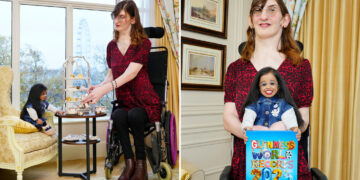News
Why fertility of women reduces at age 32, worsens at 37

A Medical Director of the Upper East Regional Hospital and member of the Fertility Society of Ghana, Dr Aiden Saanwie, has revealed that age-related infertility among women is on the rise as the number of fertile women above 30 years continues to drop dramatically.
Speaking on fertility on Bolgatanga-based Dreamz FM recently, Dr Saanwie noted that age is the major cause of growing infertility among men and women given that the older one gets, the less likely they will be able to have children.
For women, he stated that the fertility rate among women above 30 years was reducing. The decline starts at 32 and worsens at 37, he explained.
“Generally, it’s been noted that age, as a factor on its own, is a cause of fertility decline. From 32 years, fertility declines globally. Then when you get to 37, there is a sharp decline and by 50 (there is a plus or minus 5) most people will be menopausal within that period. And obviously, they would have lost their fertility at that stage. So you don’t want to get there without meeting your fertility age,” he said.
“Reproductive age should start from 18 but we know that much earlier people can give birth but looking at the age that we want to encourage people to have safe responsible sex, we also tie it to 18 years because legally, it’s allowed. So 18-35 years is good,” he added.
Ghana’s fertility rate has been declining over the years as global fertility rates plummet. The drastic reduction hurts development, according to pronatalism development experts.
News
See Photos of World’s Tallest and Shortest Women Meet for Afternoon Tea in London

The world’s tallest woman and the world’s shortest woman met for the first time this week, sipping tea from china cups — and bonding over what they have in common while celebrating their differences.

Jyoti Amge, shortest woman, and Rumeysa Gelgi, tallest woman, meet for the first time and share afternoon tea
Jyoti Amge, shortest woman, and Rumeysa Gelgi, tallest woman, meet for the first time and share afternoon tea

Jyoti Amge, shortest woman, and Rumeysa Gelgi, tallest woman, meet for the first time and share afternoon tea
Rumeysa Gelgi, from Turkey, stands at 7 feet and 0.7 inches, while Jyoti Amge, from India, is 2 feet and 0.7 inches.
Jyoti Amge, shortest woman, and Rumeysa Gelgi, tallest woman, meet for the first time and share afternoon tea

Jyoti Amge, shortest woman, and Rumeysa Gelgi, tallest woman, meet for the first time and share afternoon tea
Jyoti Amge, shortest woman, and Rumeysa Gelgi, tallest woman, meet for the first time and share afternoon tea
Jyoti Amge, shortest woman, and Rumeysa Gelgi, tallest woman, meet for the first time and share afternoon tea

Jyoti Amge, shortest woman, and Rumeysa Gelgi, tallest woman, meet for the first time and share afternoon tea
“You’re so beautiful,” said Gelgi, 27. “Thank you — you too,” replied Amge, 30.
Their meeting, over afternoon tea at London’s Savoy Hotel on Tuesday, came ahead of Guinness World Records Day, which is held annually in November to mark record-breaking achievements and encourage people to attempt records. The pair have been honored as “World Record icons” in the 70th anniversary edition of the Guinness World Records book.
Story continues below advertisement
“Meeting Jyoti for the first time was wonderful,” Gelgi said in a release Wednesday. “She’s the most gorgeous lady. I was waiting to meet her for a long time.”
Gelgi said the pair bonded over their love for makeup, jewelry and doing their nails.
Video footage showed them sitting down for tea, cakes and sandwiches stacked next to them, with the London Eye visible from the window.
Amge said in the release that she was “so happy to look up” and see the world’s tallest woman, whom she called “good-natured.” She added that it was difficult at times for the pair to make eye contact “due to our height difference.”
“Guinness World Records is all about celebrating differences,” its editor in chief, Craig Glenday, said in a statement ahead of Guinness World Record Day, which is on Thursday.
“By bringing together these two amazing, iconic women, they can share their perspectives on life with each other and, also, with us,” Glenday said.
Gelgi’s record-breaking height is due to a rare genetic condition called Weaver syndrome, which causes rapid growth, according to the National Organization for Rare Disorders.
Story continues below advertisement
The primary symptom is growth and bone development that occurs faster than usual, making those affected taller than average. People with Weaver syndrome may have rigid muscles and difficulty extending their elbows or knees.
Gelgi used a walking aid for support during the pair’s meeting. Her case of Weaver syndrome was the 27th ever diagnosed and the first in Turkey, according to Guinness World Records.
Weaver syndrome is generally caused by changes in the EZH2 gene, according to the NORD, though the organization notes that some people with Weaver syndrome do not have a mutation in the gene.
Story continues below advertisement
Amge, an actor who played the character of Ma Petite in the television series “American Horror Story,” has a genetic growth disorder that occurs in the early stages of fetal development, known as achondroplasia.
According to Johns Hopkins, the condition causes shorter bones, abnormally shaped bones and shorter stature. While the genetic defect can be passed from parent to child, in about 80 percent of cases, achondroplasia results from a spontaneous mutation that occurs in the developing embryo.
On Thursday, Gelgi shared photos on Instagram of the two exploring London despite the cold weather, posing side by side in front of Tower Bridge.
News
Speaker Abbas Decries Gross Inadequacy In Health Sector Despite Annual Allocation

News
Reps Demand Details Of Project Undertaken From Ministry Of Solid Minerals In 2024 Budget

-

 News19 hours ago
News19 hours agoDHQ Gives Updates on on Arrest, Trial of Simon Ekpa in Finland
-

 News19 hours ago
News19 hours agoJapa: 1 of 4 Nigerians want to leave the country – NBS
-

 News18 hours ago
News18 hours agoSenate mandates military to free LGs under B’Haram control
-

 News18 hours ago
News18 hours agoOUTREACH: Senator Manu concludes 2-day ICT program for constituents, distributes over 500 laptops to students (Video/Photos)
-

 News18 hours ago
News18 hours ago2027: Obasanjo’s knock on INEC reopens push for electoral reform
-

 News19 hours ago
News19 hours agoSimon Ekpa Sent To Prison
-

 News19 hours ago
News19 hours agoI’m not too young or inexperienced to run for Lagos Governor – Speaker Obasa
-

 News19 hours ago
News19 hours agoNigerian Catholic religious Sister Uti wins $1.2 million Opus Prize








